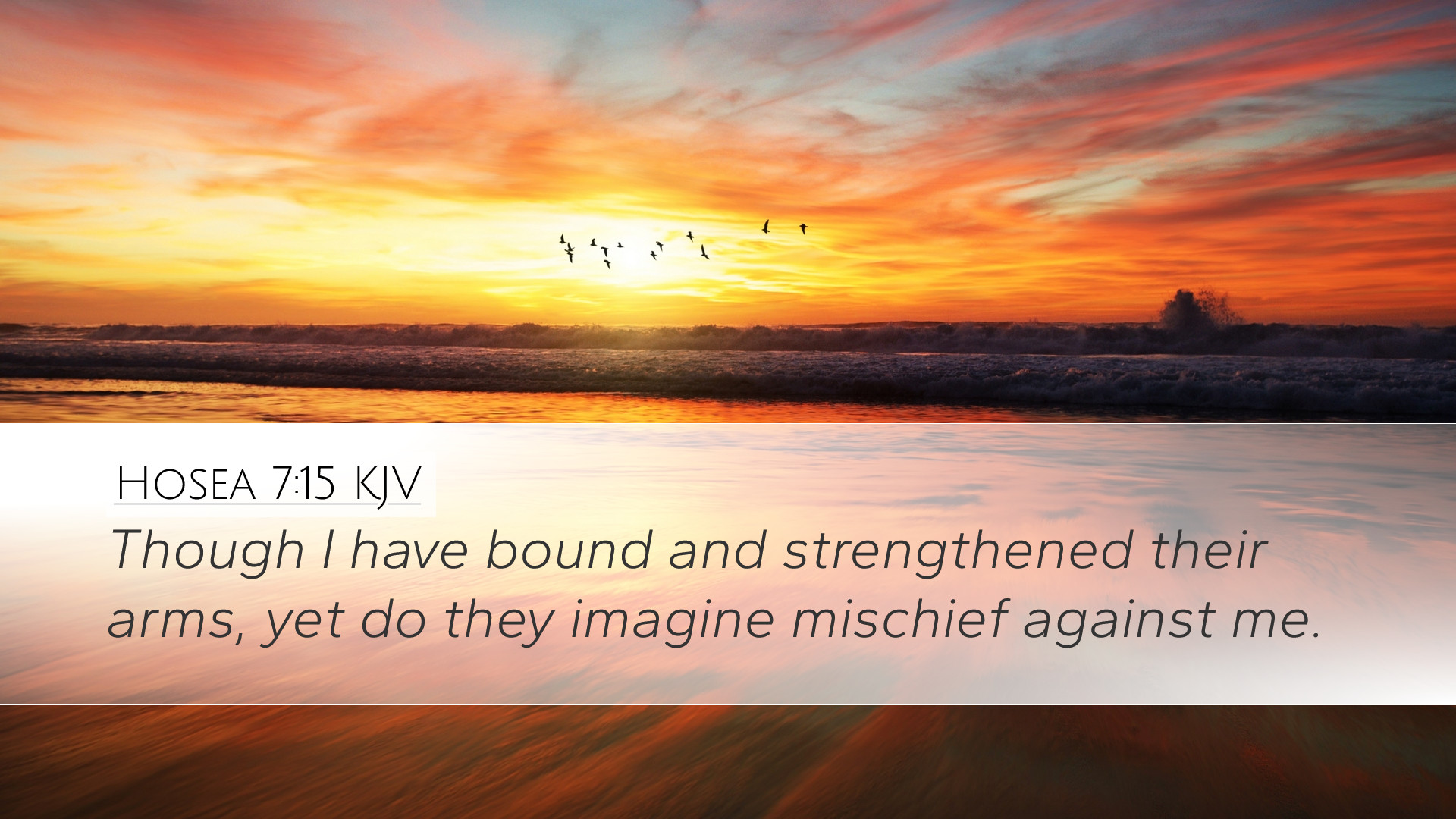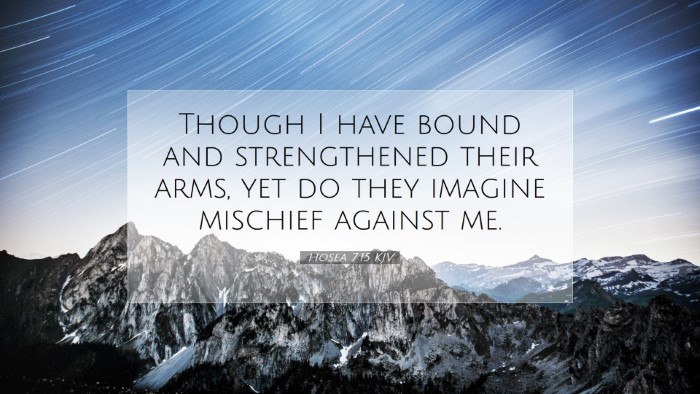Old Testament
Genesis Exodus Leviticus Numbers Deuteronomy Joshua Judges Ruth 1 Samuel 2 Samuel 1 Kings 2 Kings 1 Chronicles 2 Chronicles Ezra Nehemiah Esther Job Psalms Proverbs Ecclesiastes Song of Solomon Isaiah Jeremiah Lamentations Ezekiel Daniel Hosea Joel Amos Obadiah Jonah Micah Nahum Habakkuk Zephaniah Haggai Zechariah MalachiHosea 7:15
Hosea 7:15 KJV
Though I have bound and strengthened their arms, yet do they imagine mischief against me.
Hosea 7:15 Bible Commentary
Bible Commentary on Hosea 7:15
Bible Verse: "Though I have trained and strengthened their arms, yet do they devise evil against Me." - Hosea 7:15
This verse serves as a poignant reminder of the relationship between God and Israel, highlighting themes of divine provision juxtaposed with human rebellion. Here we delve into insights from various public domain commentaries to unpack the rich meaning embedded in this verse.
1. Contextual Background
The book of Hosea is a profound prophetic narrative that conveys God's persistent love for His people, even in the face of their recurrent unfaithfulness. Hosea addresses the northern kingdom of Israel, where idolatry and social injustice were rampant.
2. Commentary Insights
2.1 Matthew Henry's Commentary
Matthew Henry emphasizes the paradox of divine care contrasted with human ingratitude. He states that God's training of Israel, akin to a parent raising a child, has not led them to righteousness. Instead, they have responded to God's kindness with conspiracy and evil intentions. This duality—of a nurturing God and a rebellious people—highlights the tragic deterioration of Israel's spiritual state.
2.2 Albert Barnes' Notes
Albert Barnes points out that God had empowered the people, providing them with strength, skill, and resources. However, their response to divine blessing was ingratitude; they "devise evil" rather than pursue righteousness or justice. Barnes notes that this reflects a larger theme within Israel’s narrative—a failure to recognize and live in accordance with God’s covenantal blessings.
2.3 Adam Clarke's Commentary
Adam Clarke elaborates on the metaphor of God training and strengthening Israel, drawing attention to the divine empowerment given to them. He argues that God’s strengthening is analogous to an athletic coach preparing an athlete, yet the athlete chooses to sabotage their own progress. Clarke highlights the necessity of acknowledging divine help and the moral obligation that accompanies it.
3. Theological Implications
- Divine Patience: The verse showcases God's enduring patience with His people, despite their continuous wrongdoings.
- Human Responsibility: It reflects on the human capacity to choose evil even when equipped with divine blessings.
- Consequences of Rebellion: The verse foreshadows impending judgment due to spiritual and moral decay.
4. Applications for Contemporary Readers
This passage offers rich material for pastors and theologians to explore the dynamics of grace and disobedience. It encourages believers to reflect on how they respond to God’s provision. Are we using our God-given strength to pursue His purposes, or do we, like Israel, devise plans contrary to His will?
4.1 For Pastors
Pastors can use this verse as a call to guide their congregations in recognizing God’s blessings and how they might be misappropriated. Emphasizing the danger of taking God's grace for granted can prompt meaningful discussions about ethical living and accountability.
4.2 For Students and Scholars
Students of theology will find in this verse a rich tapestry of human nature and divine attributes. It serves as a case study for the examination of Israel’s historical context, the prophetic voice, and the overarching narrative of redemption within scripture.
4.3 For Personal Reflection
On a personal level, believers can meditate on the ways they may have received strength from God while still harboring thoughts or actions that are contrary to His desires. This verse is an invitation for introspection about aligning one's life with divine intentions.
5. Concluding Thoughts
Hosea 7:15 stands as a stark reminder of the fragile nature of the relationship between God and humanity. By understanding the insights from notable commentators, we can better grasp the depth of the message represented in this verse. Let us strive to respond to God’s training and empowerment with faithful living and an unwavering commitment to His will.


